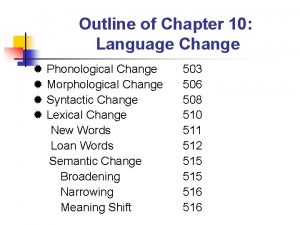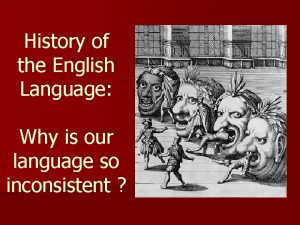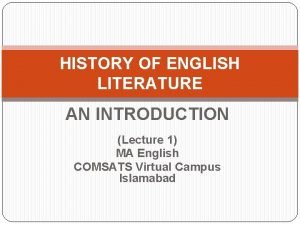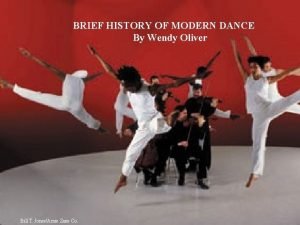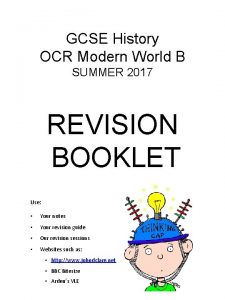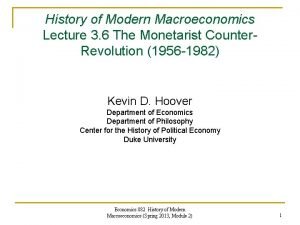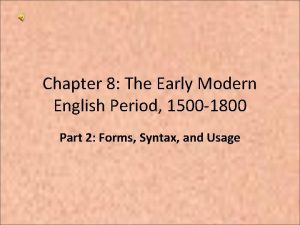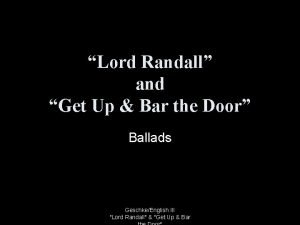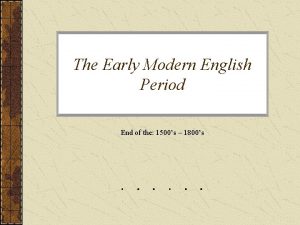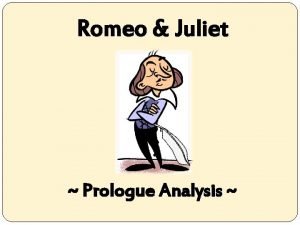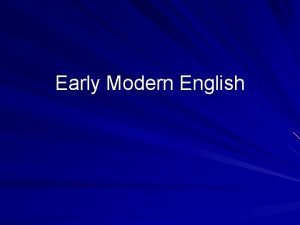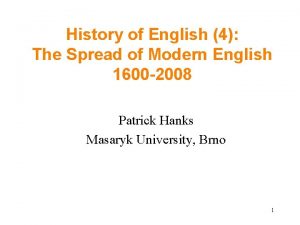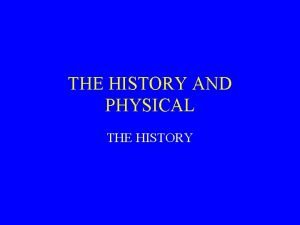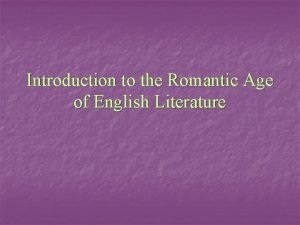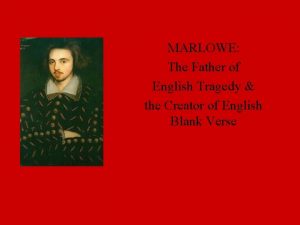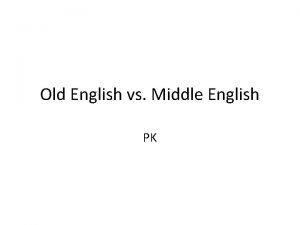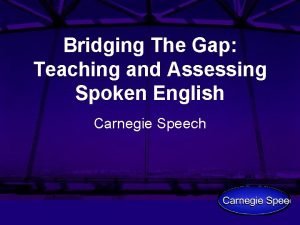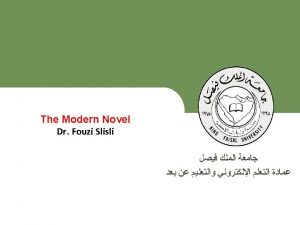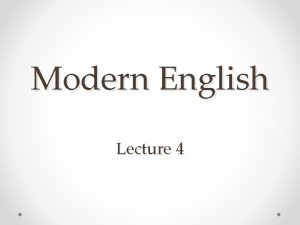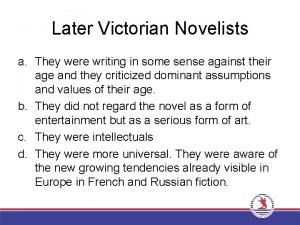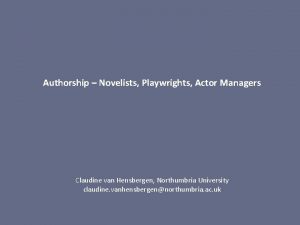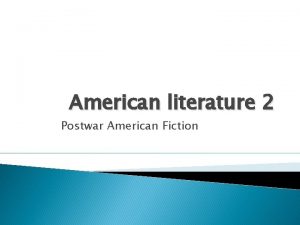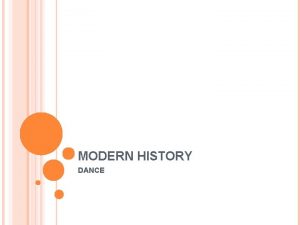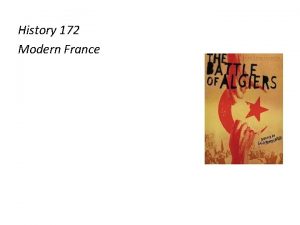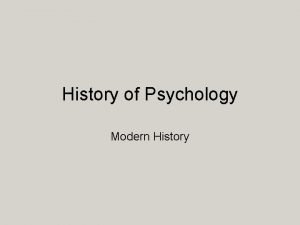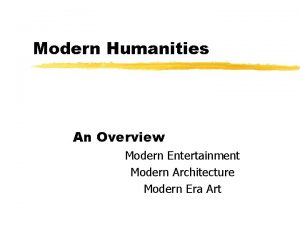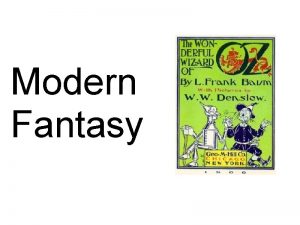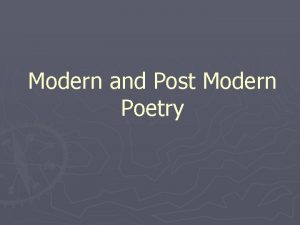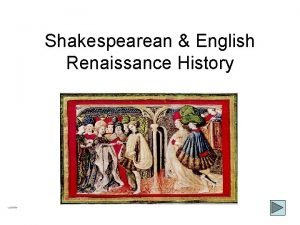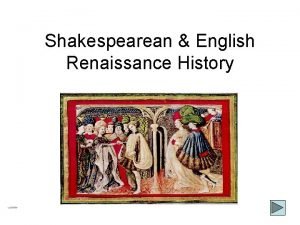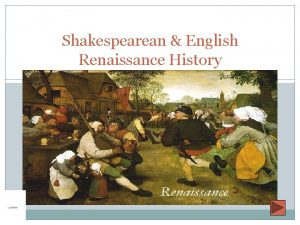Modern NovelModern Novelists Lecture 25 History of English

















































- Slides: 49

Modern Novel/Modern Novelists Lecture 25 History of English Literature COMSATS Virtual Campus Islamabad

TRENDS IN THE MODERN NOVEL • The one thing which stands out prominently in the history of the English novel, is its immense popularity at the turn of the 19 th century. It has eclipsed the poetry and the drama, it is the only literary form which has competed successfully with the radio and the cinema, and it is in this genre that work of the greatest merit is being produced. Myriads of novels pour out of the press practically every day and are received by the public with enthusiasm.

Conti. • This immense popularity may be accounted for by the fact that while compression is the characteristic feature both of the poetry and the drama, the modern man, under the influence of science, requires discussion, clarification and analysis. This is possible only in the novel, and hence the preference for it.

Conti. • Another prominent feature of the modern English novel is its immense variety and complexity. Novels are being written practically on all possible themes and subjects. A number of different trends are to be noticed. There are the traditionalists, like H. G. Wells, Arnold Bennett and Galsworthy, who, while they propound new ideas and open out new vistas to the human mind, still follow the Victorian tradition as far as the technique of the novel is concerned.

Conti. • On the other hand, there are innovators, like Henry James, Joseph Conrad, James Joyce and Virginia Woolf, who have revolutionised the technique of the novel with their probings into the sub-conscious. While H. G. Wells fully exploits modern science in his scientific romances, novelists of social reform, like Galsworthy, make the novel-form a vehicle for the discussion of the baffling socio-economic problems of the day. Biographical novels, regional novels, satirical novels, sea novels, detective novels, war-novels and novels of humour, like those of P. G. Woodhouse, continue to flood the market and the list is by no means exhaustive.

• The modern novel is realistic. It deals with all the facts of contemporary life, the pleasant as well as the unpleasant, the beautiful as well as the ugly, and does not present merely a onesided view of life. Life is presented with detached accuracy, regardless of morals or ideological considerations.

• The woes and sufferings of the poor, their misery and wretchedness, as well as the good in them, their sense of social solidarity, their fellow feeling and sympathy, are realistically presented. Joseph Conrad makes realism the basis even of his romantic tales. The modern age is an era of disintegration and interrogation.

• Old values have been discarded and they have not been replaced by new ones. Man is to-day caught between “two worlds, the one dying, the other seeking to be born. ” The choice between capitalism and communism, science and religion, God and the Atom Bomb, is a difficult one, and the result is that man is baffled and confused. The modern novel presents realistically the doubts, the conflicts and the frustrations of the modern world. It is, therefore, pessimistic in tone.

• There is large scale criticism, even condemnation, of contemporary values and civilisation. E. M. Forster is undisguised in his attack on the business mind and the worship of bigness in industrialised England of the post -war generation. Aldous Huxley analyses the disease of modern civilisation and searches for a cure, and Conrad’s novels are all pessimistic and tragic.

Realism in Modern Novel • The realism of the modern novel is nowhere seen to better advantage than in the treatment of sex. The novel has entirely broken free from the Victorian inhibition of sex. There is a frank and free treatment of the problems of love, sex and marriage. Sex both within marriage and outside marriage is a common theme of the novelist today.

• The theories of psychologists, like Freud and Havelock Ellis, new biological theories and methods of birth control, and the boredom, frustration and brutality caused by the war, go far to explain the pre-occupation of the contemporary novel with sex-themes.

• The modern novel is not merely an entertainment, not merely a light story meant for after-dinner reading. It has evolved as a serious art form. It is compact in body and integrated in form and everything superfluous is carefully avoided. It is like a well-cut garden rather than a tropical jungle, which the Victorian novel was. The modern novel is very well constructed having nothing loose or rambling about it. As Albert points out, “Henry James and Conrad evolved techniques which revolutionised the form of the novel.

• Basically they amount to an abandonment of the direct and rather loose biographical method in favour of considerations of pattern and composition, and a new conception of characterisation, built upon the study of the inner consciousness. ” Disproportionate attention is being given to theories of fiction; the novel is now judged by severely aesthetic considerations. Narration, description and style must satisfy high and exacting technical standards. Moreover, it also embodies the writer’s philosophy of life, his message, his view of the human scene.

The Stream of Consciousness Novel • Decay of Plot: Edwin Mure is right in pointing out that plot seems to have died out of the 20 th century, “Stream of consciousness novel. ” For the Victorian novelist, life easily fell into the mould of a story; but for the novelist of today it refuses to do so. “The great modern novels, like Ulysses, are still stories, but they are stories without an ending. ” The modern novel is like an incomplete sentence, and, “its incompleteness is a reflection of the incompleteness of a whole region of thought and belief. ”

Conti. • Under the influence of new psychological theories, life is not regarded as a continuous flow, but as a series of separate and successive moments. Hence a novelist, like James Joyce or Virginia Woolf, concentrates on a particular psychological moment or experience; instead of telling a story with an eye on the clock and the calendar, he probes deeper and deeper into the human consciousness and moves freely backward and forward in time. The unities of time and place have no meaning or significance for him.

• Just as the story, so also the character, has decayed in the modern novel. Previously, two different methods were adopted for the delineation of character: the method of direct narration and dramatic method. More often than not, there was a combination of both these methods. The externals of personality—the habits, manners, Physical appearance, etc. —were vividly and graphically described and further light was thrown on the nature of a character by his own words and actions and by what others said of him.

• But the modern novelist rejects such characterisation as superficial. He has realised that it is impossible to give a psychologically true account of character by such means. He probes deep into the sub-conscious, even the unconscious, and loses himself in the complexities and subtleties of inner life; instead of depicting a conflict between different personalities, he depicts the individual at war with himself. He is not concerned with any overt strife, but with the conflict that goes on in the sub-conscious regions of the human mind.

• A character is sketched not by extension but by probing the depths. Character is thus presented outside time and space. Not only are we given the ‘past’ of a character, but also the possibilities of his nature for the future are revealed. This psychological probing into the depths of human nature has been the death of both the hero and the villain in the traditional sense. Just as no man is a hero to his own personal attendant so also no man can be a hero to a “Psychoanalyst. ” The heroism of a man dissolves when we come too close to him. And this is equally true of the villainy of the villain. However, we may here add that in novelists like Conrad much that is largely traditional, both in plot and characterisation, persists side by side with much that is new and unconventional.

• As the foregoing discussion has already indicated, the modern novel is predominantly psychological. It was in the early years of the 20 th century that Freud and Jung shook the foundations of human thought by their revolutionary discoveries in the field of Psychology. They revealed that human consciousness has very deep layers and, buried under the conscious, are the subconscious and the unconscious.

• Thoughts buried deep in the unconscious and the subconscious constantly keep coming to the surface and an account of human personality cannot be complete and satisfactory, unless these hidden elements are given their due weight. Novelists, like Henry James, Joseph Conrad, James Joyce, Virginia Woolf, Dorothy Richardson, Elizabeth Bowen, have made the English novel extremely psychological in nature.

• The impact of the new psychology on plot and character has already been noticed so far. Its impact has been equally far-reaching on theme of the novel. The traditional novel was largely social, its aim being to uphold and recognise social values. But in the modern age there are no such universally acknowledged values of social conduct which the individual must uphold and cherish. Hence it is that there is a shift in theme of the modern novelist. The individual is more important for him than society.

• The psychological probings into the subconscious reveal that every individual has a separate personality peculiar to him, and that one particular personality can never merge or become one with another. Each individual is a lonely soul, and as David Daiches puts it, theme of the modern novelist is not the relationship between gentility and morality but, “the relation between loneliness and love”.

• The novelist to-day is not concerned with “the great society” i. e. society at large – but with the achievement of a “little society which can be achieved, if at all, only through great patience and care. Both Lawrence and Forster consider “the great society” as the enemy of the individual and want it to be reformed. Conrad’s chief personages are all lonely souls and betrayal of one’s own self or of others is the major theme of his novels.

• Such are the current and cross-currents in the Modern English novel. It is an extremely vital and living form of art, and we can safely predict a bright and glorious future for it. New influences, specially the Russian and the American, are daily widening its horizons and renewing its vigour and vitality.

• New experiments are being conducted, some temporary and fleeting, others of a more permanent significance. The caravan of the English novel goes on, ever-changing, becoming and growing.

Modern Novelists

H. G. Wells • Among the writers of twentieth century Herbert George Wells was the greatest revolutionary, and like Barnard Shaw, he exerted a tremendous influence on the minds of his contemporaries. Wells was the first English novelist who had a predominantly scientific training, and who was profoundly antagonistic to the classics. He insisted that classical humanism should be discarded in favour of science, and that Biology and World History should take the place of Latin and Greek.

• The novels of Wells fall into three divisions. First he wrote the scientific romances; next he tried his hand on the domestic novel, with its emphasis on character and humour; and then when he had gained sufficient fame as a writer, he wrote a series of sociological novels in which he showed his concern with the fate of humanity as a whole.

• As a writer of scientific romances, Wells stands unrivalled; they are masterpieces of imaginative power. He looks at life on earth from a higher level by projecting himself to a distant standpoint, to the moon, the future, the air, or another planet.

• In these romances Wells has shown an extraordinary ability to took into the future, and many of his predictions have proved to be true. His first scientific romance was The Time Machine (1895), in which the hero invents a ‘time machine’, which enables him to accelerate the time consciousness and project himself into the future. Here is also described in a most vivid manner the grim picture of the earth divided between a master race and their resentful serfs, the Marlocks, belonging the sub-race.

• His next work, The War of the Worlds (1898), deals with theme of the invasion of the earth by the people living on the planet Mars. They spread destruction by the use of a death-ray, but they are ultimately defeated on account of their lack of immunity from bacteria. In this way the earth is saved. The other scientific romances written by Wells were The Island of Dr. Moreau (1896), When the Sleeper Wakes (1899), The First Man in the Moon (1901) and The Food of the Gods (1904). These were the most exciting scientific thrillers which ever appeared in English fiction, and in them Wells anticipated various forms of warfare including the atom bomb.

• From fantastic romances, Wells then turned to domestic fiction. He was thoroughly familiar with the life in London suburbs, which he described with enthusiasm in Kipps (1905), a comedy of class instincts. The hero Kipps, rises from the position of a draper’s assistant to a man of fortune. The high society accepts him and trains him in its culture, but Kipps feels relived only when he loses his fortune, and relapses to the lower class from where he rose. This novel is full of satire and humour typical of Wells.

• In Tono Bungay (1909), Wells gives a most remarkable picture of the disintegration of English society in the later nineteenth century and the advent of the new rich class. In Anna Veronica (1909) which is the full-length study of a modern young woman. There is the first attempt in English fiction at a frank and open treatment of sex relationship. In Love and Mrs. Lewisham (1910), and The History of Mr. Polly (1910), Wells gives us realistic, humorous and sympathetic studies of the lower middle class life, with which he was quite familiar.

Arnold Bennett • Unlike Wells, Bennett was more concerned with the craft of fiction and was not disposed to preach in his novels. That is why, during his time he was the most popular novelist. He looked at the world as a spectacle and recorded in his novels his impressions with complete detachment. Following the example of French novelists, Maupassant, Flaubert and Balzac, he aimed at recording life—its delights, indignities and distresses—without conscious intrusion of his own personality between the record and the reader.

• Bennett wrote three most popular novels— The Old Wives Tale (1908), Clayhanger (1910) and Riceyman Steps (1923) which place him high among English novelists. His other novels are Buried Alive (1908), and The Card (1911), which are first-rate humorous character novels; and The Grand Babylon Hotel (1902), which provides good entertainment.

• In all these novels, the characters spend most of their time in the small area of the Five Towns— the Stafordshire pottery towns. The readers become familiar not only with the principal streets and buildings and landmarks, but also with the men and women who walked the streets. By an accumulation of carefully chosen details, Bennett gives a life-like quality to his novels. Though ugliness and coarseness are also presented in that otherwise pleasant picture, they, however make it more true to real life.

Henry James • Henry James, one of the important of elder novelists, was an American naturalised in England. It was, perhaps, because of his foreign origin, that Henry James was untouched by the pessimism of the age, whereas almost all his contemporaries who tried to investigate the human mind showed unmistakable signs of depression. Moreover, his characters have no background, and they move from country to country. The emphasis is more on their mental and emotional reactions.

• In his earlier novels such as The Europeans (1879), Henry James is chiefly concerned with the clash between the American and European mind. In his next important novel, What Masie Knew (1897), he gives us an exquisitely delightful picture of the young American girls brought up in the sentimental Victorian surroundings, and introduced to a modern society entirely devoid of sentiment.

• His later novels also deal with similar simple situations, pregnant with the most complex psychological effects. The Golden Bowl (1905) for instance, deals with the interactions of five characters—the American millionaire and his daughter, the Italian noble whom she marries, her penniless friend who has a love-affair with the Italian, and an elderly friend of both girls.

• It is the psychological complication both before and after the wedding, of the friends and the father, which provide the whole material of the story. Everything is narrated in a quiet undertone, and it is the nobility and decency which all the characters preserve in their behaviour, which gives a unity to the novel. The love for antique, beautiful things which the American millionaire exhibits in his character, is theme of Henry James, two other novels—The Spoils of Poynton and The Sense of the Past.

James Joyce • James Joyce was a novelist of unique and extraordinary genius. He was born in Dublin, but he left Ireland in 1904 to become a European cosmopolitan. Most of his life was spent in retirement in Paris. He was a highly gifted man and was acutely responsive to observed details. By temperament he was an artist and symbolist. He found around him an atmosphere of frustration, aimlessness and disintegration, and thus in order to express himself as a novelist he had to create for himself a different medium.

• The important novels of Joyce are The Dubliners (1914), A Portrait of the Artist as a Young Man (1916), Exiles (1918) and Ulysses. Of these Ulysses is his masterpiece. In all these novels, Joyce makes a study of the artist who frees himself from various shackles and ultimately comes to the realisation of his own true personality. In Ulysses the artist is shown at one with humanity through insight into the psychology of speech, our most intimate faculty, in which all men share and have shared. This book is presented as an epic, the counterpart of Homer’s Odyssey

Virgina Woolf • Virginia Woolf, who was the most distinguished woman writer of her generation, made a far more exciting use of the ‘stream of consciousness’ technique than James Joyce. She was greatly impressed by Ulysses, in which Joyce had found an alternative to the well-made plot and external characterisation. She found that this conception of the inner drama of the mind was fraught with tremendous possibilities, and she decided to exploit it to the fullest extent.

• In her first novel—The Voyage Out (1913), Virginia Woolf followed the traditional pattern of story—telling. Here she relates the story of a young and inexperienced girl who comes to learn something of life and the relations between the sexes, falls in love and dies of tropical fever before she can realise herself. But the real interest in the novel centres on a vogue awareness that there is a meaning in life.

• Her second novel, Night and Day (1919), offers an elaborate long drawn-out study of Katherine Hilberry, an intelligent young woman of the middle class and her relation with her mother and four friends. But the main interest lies not on theme of love, but on the conversations and introspections in which the chief characters are engaged and which gradually reveal their doubts and hesitations as they face the reality of experience.

• Her next novel, Jacob’s Room (1922), represents her first serious experiment in the stream of consciousness’ technique. Here she makes an attempt to construct pictorially the personality of a young Englishman from his infancy to the age of twenty-six, when he is killed in the war. Here the sunlit streams of youth are overshadowed by time. Frustration and death, and fires of love are quenched by human faithlessness. In this novel, Virginia Woolf’s quest for the meaning of human experience goes on but the mystery is not yet solved.

• Virginia Woolf’s most successful novel in the new ‘stream of consciousness’ method is To the Lighthouse (1927). Here the scene is set on an unnamed island, and the Lighthouse symbolize in some queer way the ‘reality’ which is never experienced. Her next novel. Orlando, which is liveliest of all, relates in a series of vivid scenes and dramatic climaxes the mental experiences of a poet while writing a prize poem.

• In The Years (1937) Virginia Woolf returned to a much simpler form of fiction. It is the novel of the generations in which the fortunes of a middle-class family from 1880 to the present time are rather sketchily represented. Her last novel Between the Acts (1941), is filled with a sense of her personal failure to wrest meaning from experiences, and the spectacle of the world at war deepens the despair.

Thank you!!!!!
 Attributes of the victorian novel
Attributes of the victorian novel 01:640:244 lecture notes - lecture 15: plat, idah, farad
01:640:244 lecture notes - lecture 15: plat, idah, farad Tumoxan
Tumoxan Old english vs modern english
Old english vs modern english Old english vs modern english
Old english vs modern english English literature lecture
English literature lecture English language lecture
English language lecture History of sugar timeline
History of sugar timeline Oliver dance
Oliver dance History of floral design
History of floral design French floral design history
French floral design history Victorian period victorian floral arrangements
Victorian period victorian floral arrangements How useful is this source
How useful is this source Distinguish between fisher and cambridge equation
Distinguish between fisher and cambridge equation Modern history
Modern history History of modern portfolio theory
History of modern portfolio theory History of modern medicine in ethiopia
History of modern medicine in ethiopia Thee in modern english
Thee in modern english Shall i compare thee to a summer's day romeo and juliet
Shall i compare thee to a summer's day romeo and juliet And the continuance of their parents’ rage translation
And the continuance of their parents’ rage translation English literature paper 2
English literature paper 2 Early modern english syntax
Early modern english syntax Early modern english
Early modern english Gary ives west yorkshire study
Gary ives west yorkshire study Macbeth act 1 scene 4
Macbeth act 1 scene 4 Lords prayer contemporary
Lords prayer contemporary Group the words and word combinations under
Group the words and word combinations under What is the theme of get up and bar the door
What is the theme of get up and bar the door Macbeth act 1 scene 7 modern english
Macbeth act 1 scene 7 modern english Early modern english period
Early modern english period Sonnet structure
Sonnet structure Romeo and juliet prologue imagery
Romeo and juliet prologue imagery Modern english time period
Modern english time period The flea translation to modern english
The flea translation to modern english History also history physical
History also history physical History of english language
History of english language History of english language timeline
History of english language timeline Argument structure
Argument structure Brief history of the english language
Brief history of the english language Brief history of english language
Brief history of english language Nature in romantic literature
Nature in romantic literature History of middle english
History of middle english Think in english speak in english
Think in english speak in english Spoken english and broken english g.b. shaw summary
Spoken english and broken english g.b. shaw summary Who is father of english tragedy
Who is father of english tragedy Difference between british and american english
Difference between british and american english Differences between american and british english
Differences between american and british english Do you speak english reported speech
Do you speak english reported speech Ic old english
Ic old english Spoken english and broken english summary
Spoken english and broken english summary


